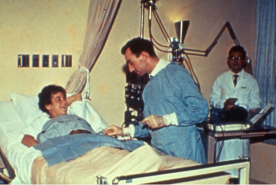By Janelle E. Gonyea, RD, LD
After receiving a new kidney, you naturally look forward to freedom from the restrictive diet you needed to follow while you were waiting for a transplant. There are so many "no nos" while following a diet designed to preserve remaining kidney function and maintain a healthful balance while on dialysis that you dream of the day when it will all go away. It's important to not let this newly found freedom all go to your head, or perhaps more importantly, to your middle. While you will again be able to enjoy foods rich in potassium and phosphorus, you must balance this with a heart healthy diet that promotes a healthy body weight. If you are unable to strike this balance, you might be talking with your physician about something called metabolic syndrome.
Metabolic syndrome is a condition where you have several problems with your metabolism all occurring at the same time. To be diagnosed with metabolic syndrome, you must have at least three of the following conditions: high blood pressure, high blood sugar, a high triglyceride level, a low HDL cholesterol level or excessive fat in and around the abdomen. Certainly, any one of these conditions alone can increase your health risk, but the combination can be very dangerous. When you have metabolic syndrome, your risk for heart disease and developing type 2 diabetes goes up dramatically. Growing evidence suggests that it can also affect the long term survival of your new kidney.1
To diagnose metabolic syndrome, your doctor will measure your waist, check your blood pressure and draw some blood. According to the American Heart Association, a waist measurement of equal to or greater than 40 inches for a man and equal to or greater than 30 inches for a woman is concerning. In other words, it is not good for your body to take on an apple-like shape. As a kidney transplant recipient, you will have your blood pressure routinely monitored. A blood pressure of 130/85 or greater is considered at risk as well. From a blood test point of view, a fasting blood sugar (drawn in the morning after not eating all night) of 100 mg/dL or greater is concerning. HDL cholesterol is believed to remove cholesterol from blood vessels and carry it back to the liver. A HDL of less than 40 mg/dL for men and 50 mg/dL for women does not offer this benefit and may indicate metabolic syndrome. Finally, a triglyceride level of 150 mg/dL or greater is of concern as well.2
Having one component of the metabolic syndrome means you are more likely to have others and certainly, the more components you have, the greater the risk to your overall health. Ideally, one should avoid development of metabolic syndrome. You are more likely to develop metabolic syndrome if you are overweight, lack physical activity, eat an unhealthy diet or have a family history of type 2 diabetes.
Becoming overweight after a successful kidney transplant is a real possibility, as it affects two thirds of kidney recipients.3 This weight gain is often attributed to the liberal nature of the diet after transplant compared to the pre-transplant diet. Also, you will likely have a better appetite after transplant, leading to a much higher food intake. This significant boost in appetite can be attributed to the fact that you are no longer uremic, as well as side effects of your immunosuppressant medications, especially the steroids that increase appetite. As a result of these two changes, one has the tendency to gain weight. At times, it may be good to gain some weight if you had difficulty with weight loss or malnutrition before transplant, but be sure to not exceed what your health provider considers a healthy weight for you. To combat undesirable weight gain, be sure to weigh yourself often and routinely visit with a registered dietitian who will give you strategies to control calories to help ensure that you maintain a desired body weight.
To help control your calories, limit your intake of high fat foods and sweets. Choose instead raw vegetables and fruit, whole grains, lean meats and skinned poultry, nonfat dairy products and low calorie or sugar free beverages.
Another necessary lifestyle change is increased physical activity. Participating in a regular exercise program is key to your success. Your goal should be at least 30 minutes of moderate-intensity activity on most days of the week. Be sure to talk to your health care provider before starting a new exercise program. If you haven't exercised for quite some time, be sure to start slow and gradually increase both the duration and intensity of your exercise program over time.
Following a healthful diet as outlined above and exercising can also reduce blood pressure, improve cholesterol and triglyceride levels as well as blood sugar levels. To maintain a desirable blood pressure, it is also important to follow a no added salt diet as well.
If you have been diagnosed with metabolic syndrome, you can make changes in your lifestyle to delay or prevent the development of serious complications that may result from having metabolic syndrome. Treatment recommendations mirror those mentioned above for prevention of metabolic syndrome. If overweight, one of the most important recommendations is to lose weight. Losing as little as 5 to 10% of your body weight can reduce blood pressure and fasting blood glucose levels. Exercise will also be very important to achieve these goals, as well as others for treatment of metabolic syndrome. If these strategies are not sufficient, your physician can prescribe medications to help in this regard as well.
Prevention and treatment of metabolic syndrome requires changes in lifestyle. Changing habits can be difficult. Talk to your healthcare providers about ways to get help to make these necessary changes. Remember, changes in lifestyle could save your life.
References:
- Bellinghieri G, Bernardi A, Piva M, Pati T, et al: Metabolic Syndrome After Kidney Transplantation. J Renal Nutr, 2009. 19(1):105-110.
- American Heart Association. Metabolic Syndrome. Accessed 2/18/2009 http://www.americanheart.org/presenter.jhtml?identifier=534.
- Jezior D, Krajewska M, Madziarska K, et al: Posttransplant Overweight and Obesity: Myth or Reality?. Transplant Proc, 2007. 39:2772-2775.
If you would like to receive a free copy of any or all of these NKF brochures contact NKF 800-622-9010 — info@kidney.org
- Life After Transplant: Your Guide to Staying Healthy After Kidney Transplantation (01-10-3012)
- Kidney Transplant (11-10-0304)
- Transplantation: Living Well on Immunosuppressant Medicines (11-10-0107)
- Staying Fit with Kidney Disease (11-10-0502)
If you would like more information, please contact us.
© 2015 National Kidney Foundation. All rights reserved. This material does not constitute medical advice. It is intended for informational purposes only. Please consult a physician for specific treatment recommendations.

















